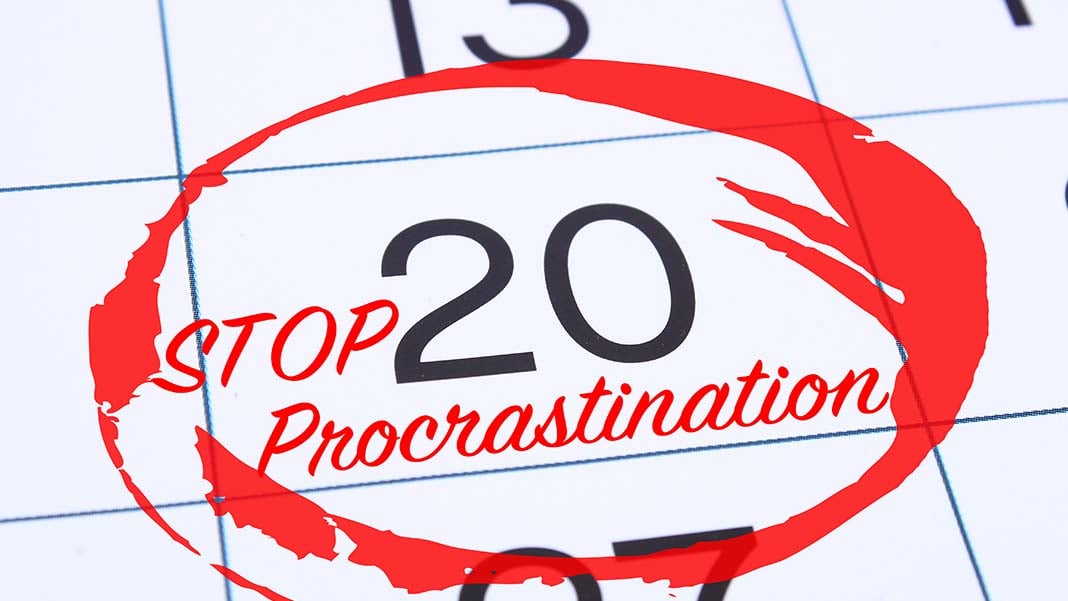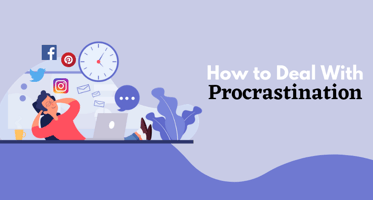Procrastination: The Thief of Time And the Silent Killer of Dreams ~ Reclaim Your Future Now!
Tips On Overcoming Procrastination
Tips On Overcoming Procrastination

Did you ever feel like you wanted to join the Procrastinator's Club but never quite got around to it? At some point in time, procrastination plagues us all, some more than others, but everyone at some point gets a bite from the bug.
We've all heard the quote, "Why put off till tomorrow what you can do today?" This is the only motivation we need for some of us, while others struggle with putting things off for weeks, months, or even years. Whenever I speak before crowds or consult with a potential client, I enforce the idea that procrastination is the thief of time and opportunity.
Procrastination doesn't have to be your way of life; you can overcome it. Procrastination can be a thing of the past with a little focus and the right attitude, coupled with some practical tips and techniques.
Sit down with Dr. Rick Wallace to conquer your procrastination!
Here are five strategies you can use today to help you bite the procrastination bug back:
- Set small goals. We often feel overwhelmed with a task, so we continue to put it off until we have no choice but to complete it.
Now throw on all the new projects we received while we were putting off the first project, and you have a prime equation for some severe procrastination.
Setting small, quickly achievable goals can help you avoid procrastinating in the first place, so you don't get overwhelmed. Here are some tips for setting those small goals:
- Break your big project up into smaller steps. These steps can be completed systematically, one at a time. Make sure you have well-defined endpoints for each smaller goal, that way, you have something to keep you going.
- Setting small goals gives you a persistent feeling of accomplishment as they're attained. With each individual success, you feel better about yourself, which motivates you to continue.
- Giving yourself breakpoints allows you to focus on each task and removes the overwhelming feeling from the job. In addition, they give you a prime place to get up, move around, and refresh yourself for the next step.
- Avoid distractions. We all do it. We sit down to start working but have to get back up and grab some coffee. Then we sit back down and check our emails, then voicemail, and then email again just to make sure no one sent a message while we were checking the voicemail. How long did that take?
- Try checking your email only twice a day instead of every 5 minutes. You need to have some time to focus!
- Get everything you want, need, or think you need before you sit down to start working so you can concentrate.
- Start giving some of your responsibilities to others instead of hogging them for yourself and creating more stress. While I don't struggle with putting things off, I am notorious for taking on everything because of not trusting others to do as thorough a job as me. Although I am very adept at managing stress, this is still not a good practice. Stress leads to procrastination, procrastination leads to tight deadlines, and tight deadlines lead to more stress; it's a vicious cycle.
- Keep a list. A constant reminder of what you absolutely need to do is a great way to avoid procrastination. A small pocket notebook or even a note card works wonders for list keeping.
- Keeping a list puts your daily to-dos in front of you at all times for quick reference.
- Include your small goals on your list. Get started early each day completing those small, easy goals. Doesn't it feel great to scratch through the things you've finished? Before you know it, the whole list is marked off!
- Turn it off. When you're done for the day, shut down everything work-related. Don't take it home if you can help it. Turn your brain off at the end of your workday. Giving your brain a break helps avoid mental exhaustion and keep your mind fresh for the next day.
- Spend time doing what you love to recharge your batteries for the next day.
Pick one or two of these techniques and try them out for three weeks. Studies have shown it takes 21 days to form a habit, and if you truly want to beat procrastination, you have to make productivity a habit. You will only be as good as what you do habitually.
When you've made a habit of one of the strategies, pick out another, and before you know it, you'll be the personification of productivity!






